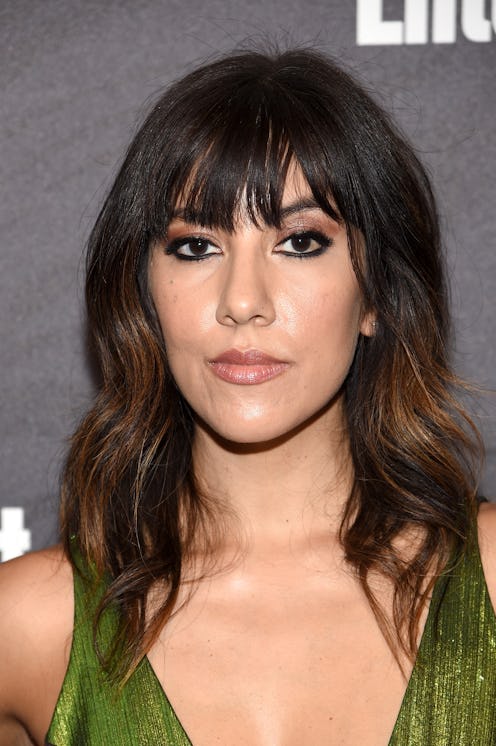Entertainment
'Brooklyn-99' Star Stephanie Beatriz Powerfully Shut Down This Myth About Bisexuality

There are plenty of ways to identify on the LGBTQ spectrum, all of which are valid. But there are also persistent myths about some sexual orientations, especially bisexuality, that need some clearing up. In a new essay for GQ, Stephanie Beatriz shut down the bisexuality myth that because someone who's bi is in a monogamous relationship with a partner, they're somehow "choosing" that partner's sex.
The Brooklyn Nine-Nine star started the essay by explaining that just because her fiancé is a man, that doesn't mean she isn't still bisexual — she'll be "bi till the day I die," as she put it. Beatriz wrote in GQ, "I'm choosing to get married because this particular person brings out the best in me. This person happens to be a man. I'm still bi."
She went on to explain that as a bisexual woman, she's had a number of "coming-out moments," to her family, friends, and romantic partners. Beatriz wrote:
"Bisexuality often needs an explanation. It isn't something you can often 'read' on a person, and because of that bi people sometimes feel like an invisible part of the LGBTQIA community. People's sexuality is often defined by who we’re partnered with at any given moment, which can be a frustrating limitation for me."
Beatriz also wrote that she experienced a moment of self-doubt about not being "gay enough" to ride a float in the D.C. pride parade, though she ended up having a great time. She ended up meeting a Brooklyn Nine-Nine fan who told her he, too, was bisexual, and he was moved by the episode in which Beatriz's character, Rosa, comes out to her family.
In December, Beatriz told Variety that growing up, she didn't see bisexual representation on TV, a point she also mentions in the GQ essay. Speaking about Rosa's coming out story, she told Variety at the time,
"I was so excited about it because as somebody who identifies as bi — queer — I just had nothing like that when I was growing up... The gay characters I can remember were most often stereotypes."
In December, Beatriz also talked to Bustle about Rosa's coming out, praising the storyline for encouraging bisexual representation on TV. "It's incredible to be a part of a show in which I get to play a character who is out and bisexual because growing up, I didn't have that sort of representation," she said at the time. "I certainly didn't have it in a woman of color, much less a Latina, so I myself am thrilled to be a little blip on the LGBTQ radar for people to have a touchstone on a show that they enjoy."
More recently, other shows, such as Crazy Ex-Girlfriend and The Bold Type, have also sought to dispel misconceptions about bisexuality. But all of these examples are still recent developments. And for years, there wasn't much bisexual representation in the TV landscape. There are still plenty of myths about bisexuality out there, which is why stories like Rosa's, and Beatriz's own experience, are so important, both on and off screen.
Speaking to Bustle in the same December interview, Beatriz hinted at how her own family reacted to her coming out. She explained, "Some of them think it's a phase. Some of them think that it's a moot point because I’m engaged to be married to a man. So, it's been tricky… it's been a little tricky with my family, and that I think is in Rosa's story."
On the show, Rosa's coming out was bittersweet — her mom didn't take the news well, though her dad did come around. There might be more with Rosa's mom in the next season of Brooklyn Nine-Nine, or there might not be. But Rosa, like Beatriz herself, spoke her truth. No one's sexuality should need an explanation, but through her GQ essay and her comments about her character, Beatriz has given a beautiful one.